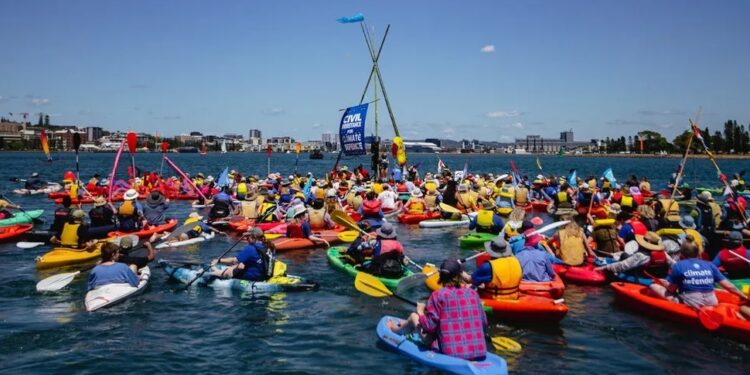By John Ikani
A two-day demonstration at the world’s largest coal port has resulted in the arrest of 109 individuals.
Activists, numbering in the hundreds, utilized swimming and kayaks to occupy the shipping lane at Australia’s Newcastle port, aiming to voice their concerns about climate inaction.
They assert that the protest thwarted the departure of over half a million tonnes of coal from the country. As the world’s second-largest coal exporter, Australia heavily relies on this fossil fuel for its electricity requirements.
Situated about 170 km (105 miles) from Sydney, the Port of Newcastle stands as the nation’s primary terminal for coal shipments.
Approximately 3,000 participants from various parts of Australia engaged in the 30-hour weekend blockade, a demonstration that had received approval from the police.
Even after the protest deadline, dozens of activists persisted in the water, resulting in 109 arrests, including five minors who were subsequently released.
On Monday, 104 individuals faced charges for their refusal to vacate the harbour channel, as reported by New South Wales police.
“I am doing this for my grandchildren and future generations,” emphasized 97-year-old Alan Stuart, who defied the designated cut-off time. Expressing remorse for the potential consequences for future generations, he deemed it his duty to take action. The organization behind the demonstration, Rising Tide, hailed it as the “largest act of civil disobedience for climate in Australia’s history.”
The protest unfolded just before the commencement of COP28, the annual global climate change summit scheduled in Dubai on Thursday. Rising Tide advocates for the government, led by Anthony Albanese, to impose taxes on thermal coal exports and cancel upcoming fossil fuel projects.
Despite Australia’s historical reputation as a climate laggard, Prime Minister Albanese, who assumed office in 2022, pledged to “join the global effort” in curbing emissions. The government has enshrined an emissions reduction target of 43% by 2030 into law, a notable increase from the previous commitment of 26-28%.
This difference equates to eliminating emissions from either Australia’s entire transport or agriculture sectors.
However, the Albanese government has stopped short of completely outlawing new fossil fuel projects. Since May of the preceding year, four new coal mines have received approval, with an additional 25 projects awaiting the green light, according to the Australia Institute.
Anjali Beams, a 17-year-old student from Adelaide and one of the last protesters to exit the Newcastle shipping lane on Sunday, jstified the urgency of her actions, citing the consistent neglect of young voices by Australia’s decision-makers.
She asserted, “I will not be complicit in letting my future get sold away by the fossil fuel industry for their profit.”


































